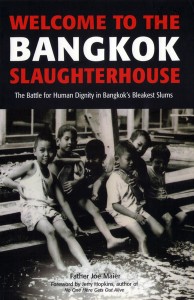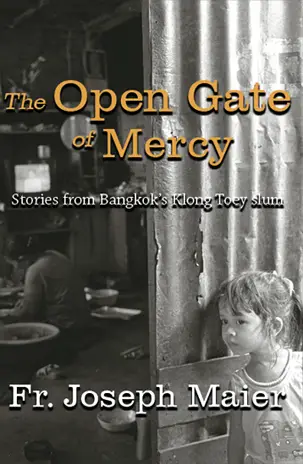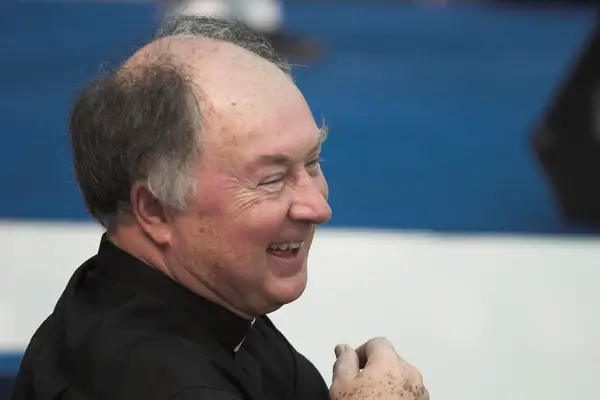 Dignity is hard to come by these days, especially if you’re poor and live in the slums. To be valued for who you are and to be treated fairly and with respect regardless of social status is something that has eluded many of the inhabitants of Klong Toey, Bangkok’s poorest slum. Also known as Bangkok Slaughterhouse, in this slum, people not only battle for dignity, but they also battle, on a day-by-day basis, for survival. To have a bowl of rice and some fermented sauce to put on top every night is already a win and to go to bed that same night, knowing that you were able to stay off drugs and did an honest job is what dignity is all about.
Dignity is hard to come by these days, especially if you’re poor and live in the slums. To be valued for who you are and to be treated fairly and with respect regardless of social status is something that has eluded many of the inhabitants of Klong Toey, Bangkok’s poorest slum. Also known as Bangkok Slaughterhouse, in this slum, people not only battle for dignity, but they also battle, on a day-by-day basis, for survival. To have a bowl of rice and some fermented sauce to put on top every night is already a win and to go to bed that same night, knowing that you were able to stay off drugs and did an honest job is what dignity is all about.
Unfortunately, the war is never over and, every day, the community of Klong Toey, wakes up early in the morning and goes to bed late at night knowing the cycle of poverty will never end. But as long as you’re not in jail, you’re not addicted to drugs, you haven’t contacted AIDS, and the police and mafia is not after you, you have a chance to survive. You have a chance to live a dignified life, albeit deprived of most of the luxuries people uptown Bangkok take for granted.
Father Joe Maier, the priest from Klong Toey, has by now reached the status of a legend not only in his slum community (for he is adamant that he belongs there), but nationally and internationally too. For his charity work, he has received praise from the higher ups in Thailand and, every year, famous people visit him and his outreach programs to congratulate him on a job well done.
But for Father Joe these visits and the accolades he’s been bestowed with mean close to nothing. What really matters to him are the people of the Klong Toey slum, for whom he cares regardless of religion, background or nationality. His first book, Welcome to the Bangkok Slaughterhouse (Asia Books, 2005), is a mini-record of the lives of some of the thousands of people who have crossed path with Father Joe, more than often asking for a roof over their heads, for a hot meal, or simply just for some advice.
The twenty-four short stories that make up the book are divided into three sections: ‘The Children,’ ‘Struggles,’ and ‘Heroes.’ As these titles suggest, the stories are about ordinary people who, when faced with extraordinary situations, battle hard to come on top. Not all succeed as, sooner or later, all children with AIDS succumb to death, police catch up with the small drug dealers (rarely going for the big sharks though), and children starving for love fall prey to pedophiles.
They are stories worth reading. They are stories of children, mothers, teachers, community leaders, and wheelchair bound people who roam the rickety boards of the sums in the hope of surviving another day.
The book opens with “A Ride on the Wild Side of Mercy,” the story of Note, a nine-year old boy who’s not only orphan, he’s also got AIDS which he received at birth from his infected parents. He likes to take care of Galong, a 35-year old kindergarten student with a form of Down’s Syndrome. “When Note dies, as die he will, we will look after Galong as best as we can, perhaps not as good as Note, but certainly better than the bar where we found him,” writes Father Joe in the ending of the story.
Most, if not all, children of Klong Toey are street smart and able to take care of themselves from a very young age. But, when four friends hear that there’s a baby elephant at Dusit Zoo who lost his mother to poachers, they decide to skip school, hire a tuk-tuk and go to the zoo. They find the elephant and tell him that if he can escape from the zoo, they’ll take care of him.
Then there’s Tik, a slum girl who had been looked after by Father Joe’s Mercy Center since she was two weeks old, when her mother went (once again) to jail, this time for a (really) long stretch. Fifteen years later, Tik is a drug addict, “one of those kids who fall through the cracks, slip through your fingers – one of the almosts, the what-ifs, the near-misses, a poor, sad and heart-breaking could-have-been.”
Most of Father Joe’s stories are tragic and heartbreaking, from teenage girls who drown in Chao Praya River while high on glue, to 12-year old girls who are used by their caretakers to walk drugs while her parents are in jail. But, the most recurring theme in ‘The Children’ chapter of Welcome to the Bangkok Slaughterhouse is kids struggling to live normal lives at the Mercy Center while AIDS consumes them from the inside. Then we have the children who have been victims of pedophiles, sometimes within their own homes, and the legal battles Father Joe’s team went through to keep these kids safe.
In Klong Toey, safety means that children can go to school and can return to a home where they won’t have to put up with drunk, drugged or abusive parents. But keeping these children in school and battling the local police and the slum mentality of ‘ma pen rai’ is hard work, as more than often, people have enough problems of their own to possess the emotional strength to care for drug-dealing incestuous pedophiles who claim their children back from the Mercy Center.
In ‘Struggles,’ the second section of the book, we see Father Joe caring for orphaned children, we see a Catholic priest taking care of the cremation of a homeless person at a Buddhist temple and crying his heart out at the lost the three surviving children had suffered.
But nothing’s worse than a fire in the slum when, in a matter of minutes, tens of families can lose their entire belonging, not to mention the roof above their heads. But what’s special about the Klong Toey slum is that in times of dire need, they do come together as a united community and, even after a devastating fire, people start picking up their lives and rebuilding their houses almost immediately.
Love in the slums is an expensive commodity but there’s plenty of love in Father Joe’s books. Even if it’s depicted as love between the homeless, the infected with AIDS and the drug addicts, it is still a universal feeling that can be discovered in the most unusual places. But, also, there’s a lot of hatred in the slums of Klong Toey, hatred for the drug-dealing rivals, hatred for the authorities, and even hatred towards your own under-aged daughters whom mothers push into prostitution.
The last section of the book is dedicated to the unsung heroes of the slums who put their life at risk for the benefit of the entire community. These could be anyone, from teachers who organize major clean ups in the wake of a meningitis outbreak, to community leaders who drive out out-of-control drug addicts, to handicapped people who kept their dignity and make ends meet doing an honest job.
Welcome to the Bangkok Slaughterhouse ends with a “happy story” – in a Klong Toey sense – in which a young woman doesn’t give up even after her parents disappear, even after her uncle and aunt die, even after the two fathers of her children leave her or end up in jail. To be able to continue being a good member of your society even after life has knocked you down more than five times, makes indeed for a happy ending.
Father Joe has been living in the Bangkok slums for the last 40 years, looking after the spiritual and physical welfare of many of the inhabitants of Klong Toey, the largest slum community in Bangkok totaling a population of over 130,000. He has opened kindergartens all over the capital, with over 4,000 slum kids enrolled.
To put and keep a slum child in school requires what for most uptown Bangkokians is a very small amount of money so the Mercy Center is always grateful when people become their patrons, thus making a huge difference in the lives of many less-fortunate children.
 In 1973, Father Joe Maier opened the Mercy Center, a shelter for street kids and a home for mothers and children with HIV/AIDS. He has also established the Human Development Foundation, a non-denominational, community-based organization which has been initiating projects to help the poor since 1974. Visit their website to find out how you can help. You can choose from doing volunteer work, donating money or sponsoring a child’s care and education.
In 1973, Father Joe Maier opened the Mercy Center, a shelter for street kids and a home for mothers and children with HIV/AIDS. He has also established the Human Development Foundation, a non-denominational, community-based organization which has been initiating projects to help the poor since 1974. Visit their website to find out how you can help. You can choose from doing volunteer work, donating money or sponsoring a child’s care and education.
If you are fascinated by the story of this Redemptions priest from the United States who come to Thailand as a missionary in 1967, I also recommend reading Father Joe’s most recent book, The Open Gate of Mercy (Heaven Lake Press, 2012) which is written in the same style and with the same pathos as the book reviewed here. Greg Barrett’s biography, The Gospel of Father Joe: Revolutions and Revelations in the Slums of Bangkok (Jossey-Bass, 2008), an award-winning literary non-fiction book about Fr. Joe Maier’s life journey is worth reading too.
Welcome to the Bangkok Slaughterhouse and The Open Gate of Mercy are both available at Kinokuniya and Asia Book and Father Joe’s biography can be purchased via amazon.com.
Initially published in Mango Metro (July 2013, Vol. 7, No.8)


